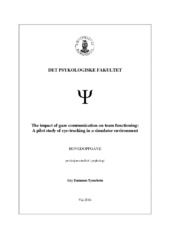The impact of gaze communication on team functioning: A pilot study of eye-tracking in a simulator environment
Master thesis
Permanent lenke
https://hdl.handle.net/1956/8008Utgivelsesdato
2014-04-14Metadata
Vis full innførselSamlinger
- Faculty of Psychology [523]
Sammendrag
This pilot study aimed to examine the feasibility of a future main experiment that will address the role of gaze communication in team functioning in a simulator environment. Feasibility was operationalized in terms of whether or not eight specified criteria were met, and resources needed to preprocess eye-tracking data were estimated. A matched-subjects between-subjects design is planned for the main study to ensure homogeneity between participants in experimental groups, while the pilot study is a within-subjects design. Students of maritime navigation were recruited to participate in the study during their scheduled simulator training. The eye movements of one of the participants in a two-person team were recorded during planning and navigation of a given task, and an expert rating of the team's performance was collected. Each team was recorded at two time-points with an intervening treatment (gaze communication training), and questionnaires measuring shared mental models and performance were distributed six times. The study showed that too few feasibility criteria were met for the main study to be considered feasible if conducted as originally planned, and that considerable resource use should be expected for preprocessing of eye-tracking data. Improvements to the design and sample size considerations are discussed based on the pilot study and literature review.
